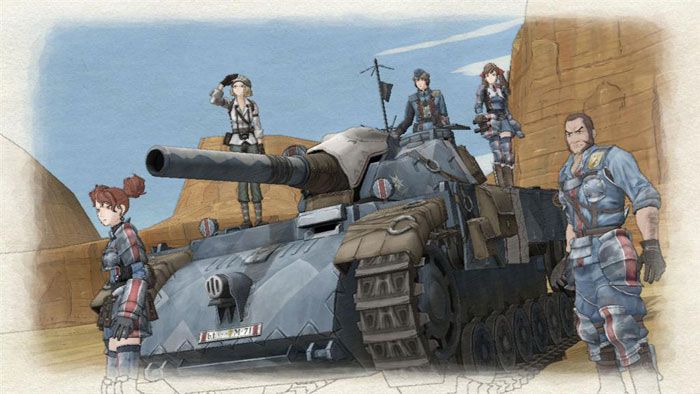Hitoshi Sakimoto Interview: Underscoring the Human Drama of a War Story (October 2008)
Interview Credits
Interview Subject: Hitoshi Sakimoto
Interviewer: Michael Naumenko
Editor: Michael Naumenko, Simon Elchlepp
Coordination: Michael Naumenko
Interview Content
Michael: First of all, tell our readers about yourself. How and when did you enter the game industry?
Hitoshi Sakimoto: I first started in the industry when I was 16 years old, manipulating music for a PC magazine. Specifically, I arranged music for POPS and games, which were popular at the time, making sound using build-in sound sources. I also wrote a small column using an old music language, called MML, for the magazine. After that, while I was at high school, I worked part-time as a programmer for a PC game developer. When I was in my 3rd year of high school (17-18y/o), we created a shooting game called Revolter with some other volunteers. This was my first attempt at composing and this resulted in offers to produce game sounds.
Michael: You have worked on the anime Romeo X Juliet. What was the difference between working on a game and a movie?
Hitoshi Sakimoto: In the case of game music, generally for all pieces, I make a demo, the client will check it and we then redo what's necessary. We then repeat these steps until the pieces are finalised and finished. In the case of animation music, I create the theme music and the client checks it - similar to a game - but most other pieces are created according to the client's brief and they simple choose the pieces they like for inclusion in the anime. I don't know which procedure is better, but I think it's the biggest difference between game music and animation music.
Michael: Let's talk about Valkyria Chronicles, which has just been released in Europe and the US. What can players expect from the game and your music?
Hitoshi Sakimoto: While at first sight, the game is about a war and mystic being called Valkyrians, I wanted to score the game as a human drama. The focus is on the characters, who are thrown into the hostile environment of a war, but they remain ordinary people and their love for each other continues to develop.
Michael: How much music did you write for Valkyria Chronicles and how much of it survived and was included in the game?
Hitoshi Sakimoto: I think it was around 60-70 pieces. Even though some of them were killed (rejected), the developers still tried to use them somehow, so most of the pieces are used in the game.
Michael: What can you tell us about the style of the soundtrack?
Hitoshi Sakimoto: Although this game is a war time story, the producer asked me to focus the music on the human drama aspect of the game. But there are still a lot of military scenes, so I put in some military colour.

Michael: You have previously recorded with Australia's Eminence Symphony Orchestra. Did you work with them on Valkyria Chronicles as well? If so, how many sessions were recorded and how big was the ensemble?
Hitoshi Sakimoto: Yes, I worked with the Eminence Symphony Orchestra. I think there were around 60 musicians involved in the recording.
Michael: Are you proud of your work?
Hitoshi Sakimoto: In the case of our work, there is often quite a delay between when we finish the music and when the game is released. During this time, we most likely have already started on another project. However there is always an opportunity to look back at the development of a game's music, with all the advertising and interviews once a game is released. I always try to improve. I always want to create something better than last time. So I believe my most recent pieces are my best. Sometimes we are required to work under very tight deadlines, but I always try to do my best under any circumstance.
Michael: With whom would you like to collaborate in the future?
Hitoshi Sakimoto: I can't yet say the name, but in fact, I would be happy if I could write a song for a chanson (French music) singer. It's my dream.

Michael: What advice can you give to aspiring composers?
Hitoshi Sakimoto: I have seen lots of young amateur composers that tend to take a long time to compose one piece of music. But I think you can learn a lot more if you finish composing a track as quickly as you can, don't modify the piece after you've finished it, and move on to the next piece. And then on your next attempt, do your best.
Michael: Many thanks for your time!
















